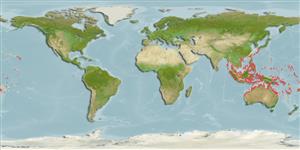>
Ovalentaria/misc (Various families in series Ovalentaria) >
Pomacentridae (Damselfishes) > Pomacentrinae
Etymology: Pomacentrus: Greek, poma, -atos = cover, operculum + Greek, kentron = sting (Ref. 45335).
More on authors: Jordan & Starks.
Environment: milieu / climate zone / depth range / distribution range
पारिस्थितिकी
समुद्री प्रवाल-भित्ति संयुक्त; गैर प्रवासी; गहराई सीमा 1 - 20 m (Ref. 9710). Tropical; 36°N - 32°S, 79°E - 133°W
Eastern Indian Ocean and Western Central Pacific: Sri Lanka to the Line and Tuamoto islands, north to southern Japan, south to Rowley Shoals and Lord Howe Island.
आकार / वज़न / Age
Maturity: Lm ? range ? - ? cm
Max length : 9.0 cm TL पुल्लिंग / अलिंग; (Ref. 9710)
पृष्ठीय रीढ़ (सम्पूर्ण): 13; पृष्ठीय सौफट रेज़ (सम्पूर्ण): 13-15; गुदा कांटा 2; ऐनल सौफट रेज़: 14 - 15.
Adults inhabit lagoon and seaward reefs, close to the bottom among rubble beds. Feed on zooplankton and to a lesser extent on benthic algae. Juveniles often school among soft corals. Adults in small groups or congregate in large numbers over favorable sections of reef (Ref. 48636). Oviparous, distinct pairing during breeding (Ref. 205). Eggs are demersal and adhere to the substrate (Ref. 205). Males guard and aerate the eggs (Ref. 205).
Life cycle and mating behavior
परिपक्व अवधि | पुनरुत्पत्ति | मछलीऔ का अंडे देना | अंडे | Fecundity | लार्वा
Oviparous, distinct pairing during breeding (Ref. 205). Eggs are demersal and adhere to the substrate (Ref. 205). Males guard and aerate the eggs (Ref. 205).
Allen, G.R., 1991. Damselfishes of the world. Mergus Publishers, Melle, Germany. 271 p. (Ref. 7247)
IUCN Red List Status (Ref. 130435)
Threat to humans
Harmless
Human uses
जलजीवालय: व्यापारिक
अधिक जानकारी
संदर्भजलीयकृषिजलीयकृषि रूपरेखाखींचआनुवंशिकीElectrophoresesहैरेटिबिलटीबीमारीप्रक्रमणNutrientsMass conversion
साधन
Special reports
Download XML
इंटरनेट स्रोत
Estimates based on models
Preferred temperature (Ref.
123201): 24.9 - 29.3, mean 28.5 °C (based on 1955 cells).
Phylogenetic diversity index (Ref.
82804): PD
50 = 0.5000 [Uniqueness, from 0.5 = low to 2.0 = high].
Bayesian length-weight: a=0.01445 (0.00815 - 0.02564), b=2.95 (2.79 - 3.11), in cm total length, based on LWR estimates for this species & (Sub)family-body (Ref.
93245).
Trophic level (Ref.
69278): 3.2 ±0.28 se; based on food items.
लौटाव (Ref.
120179): ऊंचा, न्यूनतम जनसंख्या दुगनी समय अवलागत 15 महीने। (Preliminary K or Fecundity.).
Fishing Vulnerability (Ref.
59153): Low vulnerability (10 of 100).
Nutrients (Ref.
124155): Calcium = 129 [77, 240] mg/100g; Iron = 0.966 [0.602, 1.551] mg/100g; Protein = 18.6 [17.5, 19.6] %; Omega3 = 0.153 [0.091, 0.258] g/100g; Selenium = 19.7 [10.8, 38.2] μg/100g; VitaminA = 235 [81, 652] μg/100g; Zinc = 1.92 [1.31, 2.72] mg/100g (wet weight);
